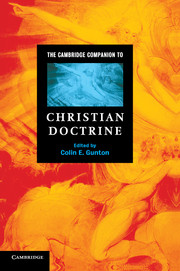Book contents
- Frontmatter
- Part one Christian doctrine in the late twentieth century
- 1 Historical and systematic theology
- 2 On doctrine and ethics
- 3 The basis and authority of doctrine
- 4 The scope of hermeneutics
- 5 Christ and the cultures: The Jewish people and Christian theology
- 6 Christ and the cultures: Christianity and the arts
- Part two The content of Christian doctrine
- 7 The triune God
- 8 The doctrine of creation
- 9 Human being, individual and social
- 10 Redemption and fall
- 11 The church and the sacraments
- 12 Eschatology
- 13 Jesus Christ
- 14 The Holy Spirit
- General index
- Index of biblical references
1 - Historical and systematic theology
Published online by Cambridge University Press: 28 May 2006
- Frontmatter
- Part one Christian doctrine in the late twentieth century
- 1 Historical and systematic theology
- 2 On doctrine and ethics
- 3 The basis and authority of doctrine
- 4 The scope of hermeneutics
- 5 Christ and the cultures: The Jewish people and Christian theology
- 6 Christ and the cultures: Christianity and the arts
- Part two The content of Christian doctrine
- 7 The triune God
- 8 The doctrine of creation
- 9 Human being, individual and social
- 10 Redemption and fall
- 11 The church and the sacraments
- 12 Eschatology
- 13 Jesus Christ
- 14 The Holy Spirit
- General index
- Index of biblical references
Summary
Historical and systematic theology are disciplines concerned with the content of Christian teaching. Historical theology is that discipline whose task is to expound the course of Christian theology through time, within its different historical and cultural contexts. Systematic theology's distinctive character derives from its responsibility for articulating the meaning and implications of the church's claims for the truth of the Christian gospel. In some conceptions of its task, systematic theology is simply a fashionable way of speaking of what used to be called dogmatic theology; in others, a more conscious orientation to the characteristic conditions of the modern world is in view. We shall return to that question at the end of the chapter.
Despite their differences, however, the two studies do not follow entirely different courses, for their tracks cross in many places. One example will introduce what is meant. To study the history of the development of Christian theology in its formative years, the student needs to be aware not only of the systematic interconnections of - above all - the doctrines of God and of the person of Christ but also the relation of the Christian world of thought to other aspects of ancient culture, perhaps especially Greek philosophy and religion.
- Type
- Chapter
- Information
- The Cambridge Companion to Christian Doctrine , pp. 3 - 20Publisher: Cambridge University PressPrint publication year: 1997
Accessibility information
- 4
- Cited by

